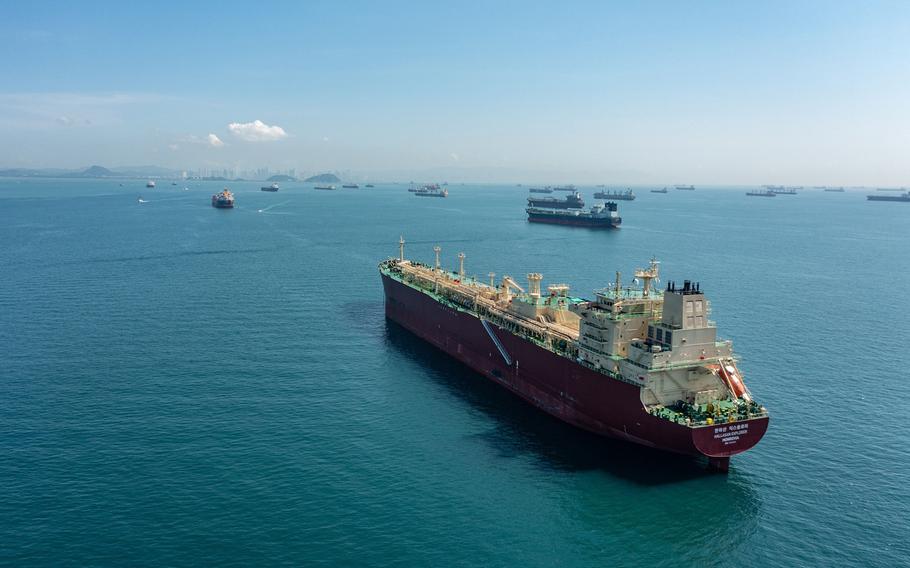
Cargo ships wait in the anchor zone to cross the Panama Canal from the Pacific entrance near Panama City. (Walter Hurtado/Bloomberg)
The congestion at Panama Canal could be to Europe’s benefit as US liquefied natural gas supplies will largely bypass Asia.
The price gap between the Asian spot LNG price and the European gas benchmark for January has widened in recent weeks, but it’s not enough to encourage shipping American gas to Asia via longer routes through the Suez Canal or the Cape of Good Hope, according to S&P Global Commodities Insights.
“The opportunity to sell more profitably to Asia over Europe from the US depends on your access to Panama Canal slots,” said Ciaran Roe, a global director for LNG at S&P. “If you have these, then your costs may be sufficiently low to send the cargo to Asia more profitably than to Europe for January arrivals, otherwise it’s more profitable for cargoes to go to Europe.”
The glut of LNG shipments in the Atlantic that pushes prices lower at the height of the heating season would be an advantage for Europe. The development would also ease fears that Asia may pull fuel away from the continent during the frigid winter.
The gap between Asian spot LNG and the super-chilled fuel delivered into northwest Europe is about $3 per million British thermal units now, Roe added. A difference of only $2.40/MMBtu makes it more profitable to ship a US cargo to northeast Asia over northwest Europe. But to make a shipment more profitable via Suez or the Cape, the price gap needs to be around $3.7/MMBtu or above, he said.
The Panama Canal is a vital shipping route for LNG supplies from the US - the world’s top exporter - to north Asian nations such as Japan, Korea and China. However, a record drought, coupled with projections of poor rainfall for the rest of year, has limited traffic drastically.
While some vessels have paid record-high prices in auctions to jump the queue, most others are avoiding the waterway altogether, opting for longer voyages rather than adding weeks of waiting.
From December, LNG shippers face even higher uncertainties in securing a transit slot, as they lose top priority to container vessels, according to BloombergNEF. That means the number of LNG tankers passing through the route could even drop to zero in January when auctions for slots will no longer be held, it said.
US LNG is free of destination restrictions and can be redirected anywhere, depending on demand and prices.
For example, the Panama Canal congestion cost on the journey from Sabine Pass in the US to Futtsu in Japan makes up almost a third of total shipping costs in January, at $5.6 million, data from Spark Commodities show, taking into account delays of 29 days for a return trip.
While arbitrage opportunities could still make it lucrative for holders of US-origin LNG to direct cargoes to Asia instead of Europe, full inventories in Asia are another factor in play, according to Rystad Energy.
“With inventory levels at several major LNG import terminals in China and South Korea currently high, LNG suppliers are struggling to find buyers willing to purchase cargoes,” Masanori Odaka, a senior analyst at Rystad Energy, said in a note this week.
With assistance from Stephen Stapczynski.
Visit bloomberg.com
©2023 Bloomberg L.P.